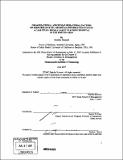| dc.contributor.advisor | Gabriel R. Bitran. | en_US |
| dc.contributor.author | Hozumi, Dairiku | en_US |
| dc.contributor.other | Sloan School of Management. | en_US |
| dc.coverage.spatial | n-us-ma | en_US |
| dc.date.accessioned | 2007-11-16T14:15:56Z | |
| dc.date.available | 2007-11-16T14:15:56Z | |
| dc.date.copyright | 2007 | en_US |
| dc.date.issued | 2007 | en_US |
| dc.identifier.uri | http://hdl.handle.net/1721.1/39513 | |
| dc.description | Thesis (S.M.)--Massachusetts Institute of Technology, Sloan School of Management, 2007. | en_US |
| dc.description | Includes bibliographical references (leaves 104-105). | en_US |
| dc.description.abstract | Improvement in efficiency of healthcare in the United States is an urgent issue. Information technology is seen as one of key solutions to improve efficiency. As such, hospitals in the United States are rapidly adopting information technology. However, past studies on information technology development projects in other industries have documented a very high rate of failure, typically attributable to the lack of treatment of organizational and behavioral factors. These studies placed their focus on the development phase of information technology projects but very few studied the performance of installed information systems and factors affecting their performance. In our study, we developed an analytical framework to measure the performance of an existing information system and to identify determinants of its performance based on the Performance of Routine Information System Management Framework by MEASURE Evaluation Project, United States Agency for International Development. Performance is defined as the quality of data and the use of information an information system generates. Technical, behavioral, and organizational factors are considered as determinants of Performance. | en_US |
| dc.description.abstract | (cont.) We evaluated the performance of an information system which records operating room delays and their causes at a large teaching hospital in Boston, Massachusetts, USA. The study was carried out between January 2007 and April 2007. The data on operating room delays from fiscal year 2006 were used to assess the data quality. Our study found poor quality of data and a low level of use of information. Data quality was poor in terms of accuracy and relevance and very few people used the information that the system generated for decision-making. The performance of the information system was influenced by 1) technical factors such as the confusing structure of data variables and the application design, 2) organizational factors such as the lack of a defined purpose for the information system in operating room delay management and the lack of supervision and training, and 3) behavioral factors such as diminished motivation for gathering accurate information for the information system. Finally, we proposed a set of recommendations to improve the performance of the information system. | en_US |
| dc.description.statementofresponsibility | by Dairiku Hozumi. | en_US |
| dc.format.extent | 105 leaves | en_US |
| dc.language.iso | eng | en_US |
| dc.publisher | Massachusetts Institute of Technology | en_US |
| dc.rights | M.I.T. theses are protected by copyright. They may be viewed from this source for any purpose, but reproduction or distribution in any format is prohibited without written permission. See provided URL for inquiries about permission. | en_US |
| dc.rights.uri | http://dspace.mit.edu/handle/1721.1/7582 | |
| dc.subject | Sloan School of Management. | en_US |
| dc.title | Organizational and human behavioral factors on performance of a hospital information system : a case study from a large teaching hospital in the Boston area | en_US |
| dc.type | Thesis | en_US |
| dc.description.degree | S.M. | en_US |
| dc.contributor.department | Sloan School of Management | |
| dc.identifier.oclc | 173846096 | en_US |
